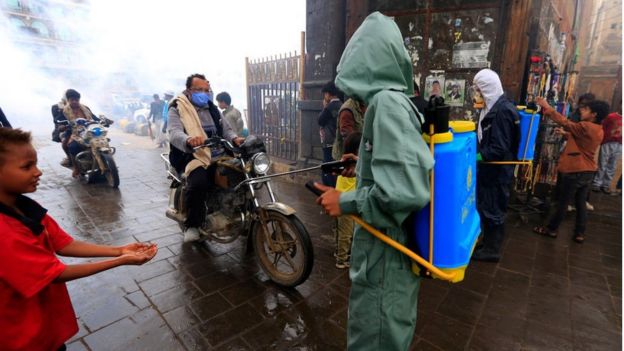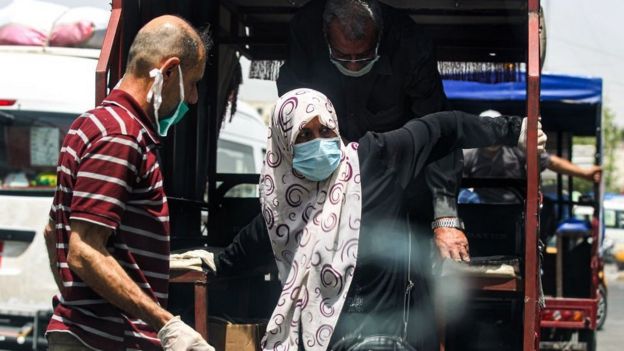 |
Rising anger in the Middle East over the corona virus |
There are many reasons for the Middle East to be concerned about the global coronavirus outbreak, but as far as combating it is concerned, the region is ahead of the rest. The majority of the region's population is young.
According to some estimates, 60% are under 30 years of age. As a result, they are less likely to be infected with the corona virus than in the rest of the world, with more elderly people dying from the disease.
When most of the countries in the region saw the situation elsewhere, they had time to impose curfews and social distances, but this is where the region's superiority over the rest of the world ended. Weaknesses in the system have been exacerbated by years of instability and will be exacerbated by this global epidemic.
Medical facilities are there and nowhere else. Israeli hospitals are like the best hospitals in the world. The health system in Yemen, Syria and Libya, which was not so good before, has been severely damaged by years of war or in some places destroyed.
According to the United Nations, Yemen is already suffering from the worst humanitarian crisis in the world.
Aden in the south of the country is plagued by political strife. Even after the announcement of two deaths from Covid 19, citizens are turning to markets and mosques, ignoring the curfew.
Expect anxious situations
The same young generation that is most likely to survive the epidemic was protesting against their governments before the disease spread.
Citizens of each country have different grievances with the authorities, but protests in the Arab parts of the Middle East have been fueled by corruption, nepotism and reform. The corrupt ruling class is accused of stealing money from the public coffers that should have been spent on the welfare of the people, including hospitals.
In Algeria, Lebanon and Iraq, a president and two prime ministers have been ousted. Protesters staged sit-ins in central areas of the capital and were unwilling to leave. Six hundred protesters were shot dead and thousands wounded in Iraq, but they did not leave.
The irony for young people who have not cleared the streets for months is that the corona virus has forced them to stay indoors.
When they get out, they will realize that the economy, which has failed miserably to provide them with jobs, is in even worse shape.
This will result in more anger which is increased due to this disease but which is not due to the disease. Authorities will not have much choice.
 JTN IMAGES
JTN IMAGES
 JTN IMAGES
JTN IMAGES
The economic inheritance night
The global shutdown has already hit the Middle East economies.
Lebanon's devastated economy, which plunged protesters into poverty, was on the brink of collapse before the virus hit. Protesters set fire to bank buildings and surrounded them.
Major countries in the Middle East will need to reconsider their ambitions, which include a dangerous and costly foreign policy. Gone are the days when attorneys could be bought and proxy wars were fought.
Lena Khatib, head of the Middle East program at Chatham House, a global watchdog, said major powers in the region, such as Saudi Arabia and Iran, would have to reconcile their accounts of the spread of extremism in the region.
He further added that he would be forced to think about what to give priority to. They will have to make sacrifices they did not expect in the past, such as in Yemen and Syria.
The economic woes of the corona virus will be detrimental to everyone, whether they are oil-borne Gulf billionaires or daily wage earners in Egypt.
Millions of people in poor countries make a living by earning a living. If they can't work during the curfew, they don't have money to eat.
 JTN IMAGES
JTN IMAGES
 JTN IMAGES
JTN IMAGESGrowing anger
The sharp fall in oil prices has led to a sharp drop in the incomes of countries that previously seemed invincible.
Saudi Arabia's most expensive plan to end the country's dependence on oil is no longer viable because the country cannot afford it.
Algeria's 60 percent of its income came from oil and gas reserves, and the country's spending is now being cut by a third. The weekly "Harak" protests in Algeria have been going on for a year and were stopped in March due to a virus. But as soon as the consequences of the decline in public investment in the country are felt, the protesters will take to the streets again.
The wave of awakening in the Arab world in 2011 came at the expense of the younger generation who believed that their future was being taken away from them. The hopes for change that they brought were either lost or crushed, but before the epidemic, people were once again growing angry.
The damage caused by the virus could lead to a new political storm.



No comments:
Post a Comment